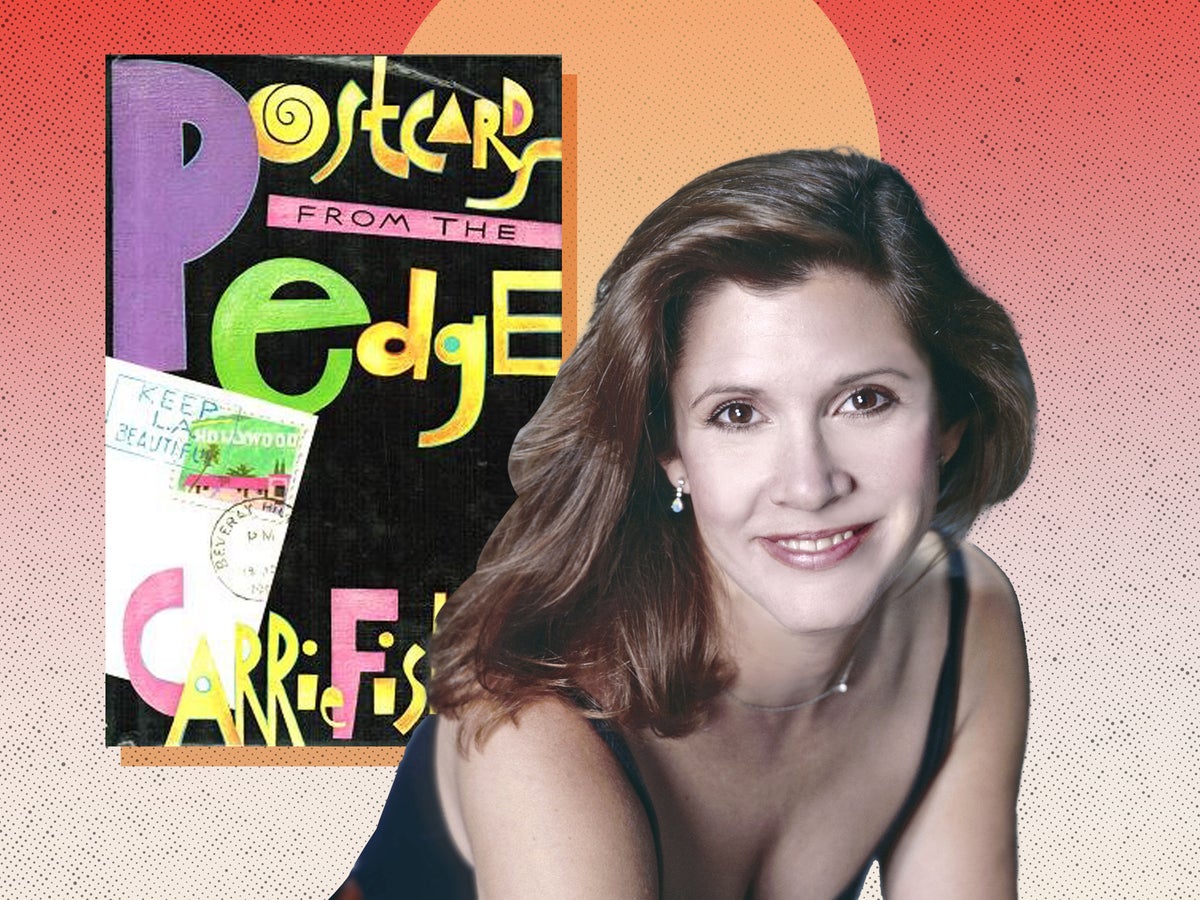
In the summer of 1985, Carrie Fisher received a letter asking if she’d like to write a book. At the time, the 28-year-old actor wasn’t at home, nor was she on a set. She was halfway through treatment at New Beginnings rehab centre in Los Angeles. Fisher, whose role as Princess Leia in the Star Wars trilogy had recently catapulted her to A-list fame, had been losing control of her drug use. Months before, she had accidentally overdosed on tranquillisers and had been bundled, unconscious, into the front passenger seat of a car by three friends and rushed to Cedars-Sinai Medical Center where her stomach was pumped, saving her life.
The invitation couldn’t have been better timed. Not only did she want to write a book, she already knew what the first line would be, inspired by her recent ordeal in the emergency room. “Maybe I shouldn’t have given the guy who pumped my stomach my phone number, but who cares? My life is over anyway,” Fisher deadpans in the opening pages of her roman à clef, Postcards from the Edge, a razor-sharp book about addiction and mental illness that is celebrating its 35th anniversary this year. It’s a novel that still dazzles and provokes, even today – and paved a way for Fisher at a crossroads in her life and career. Fast, erudite, and searingly funny, Fisher’s kamikaze tale of a Hollywood actor’s adventures in and out of rehab took her vulnerabilities by the scruff of the neck and shook them onto the page. From cocaine binges and AA graduations, to toxic first dates and absurdist Hollywood brunches, what keeps readers returning time and time again isn’t simply the novel’s tell-all honesty – it’s the author’s satirical lens.
“Pity me for taking my Everything-That-a-Human-Can-Possibly-Be-Offered and turning it into scallops and Percodan on the emergency room floor,” her protagonist, Suzanne Vale, later jokes. And with a line like that, a new career was born. Tossing aside that objectifying metal bikini and disentangling herself from her high-octane marriage to singer-songwriter, Paul Simon, Fisher’s foray into fiction took both friends and critics by surprise. Who knew she could write like this, seemed to be the prevailing response. “This book is so much better than you think it’s going to be!” one Los Angeles Times reviewer enthused at the time – comparing Fisher’s debut to Bret Easton Ellis’s Less than Zero before declaring it to be “a “serious” piece of work”. The epistolary exchanges, the diary extracts, the third-person narrative; Fisher deftly careens through it all with a literary ease that elevated her to the status of a mercurial writer.
How much of the character of Suzanne Vale (a Hollywood actor “clawing her way back from the edge in a drug rehabilitation clinic”) is based on real life has been hotly debated – although the central similarities are hard to ignore. Like Fisher, 30-year-old Vale is a Hollywood actor who is wrestling with two versions of herself: the unstable addict who is trying to “dial down” the deafening voices inside her head, and the strong-willed entertainer who knows “how to act like a regular person” because “portraying reality had become her way of experiencing it”. The seemingly autobiographical narrative, however, isn’t as reliable as Fisher would have you believe. “Easy to raise the veil on Vale and see Carrie Fisher behind it,” friend and fellow mental health advocate, Stephen Fry, proffered in a recent foreword for the novel. Harder to step back and survey the skill, the writerly prowess, that blends the two so seamlessly into one. “In all the years I knew her, Carrie never exhibited any of the self-pity in which her hero is prone to luxuriate”, Fry continued. And so enters Fisher the author. It was during the writing of Postcards that she stopped thinking of herself as “an actress who writes”, and started describing herself as “a writer who acts” – embracing a love affair with language that began (according to Sheila Weller’s biography, Carrie Fisher: A Life on the Edge) when Fisher was five years old, performing plays she’d written in her wardrobe for her mother, Hollywood’s grand dame Debbie Reynolds.
Writing would soon become a vital form of expression – the only way she could wrestle with her demons on her own terms. “There are a couple of reasons why I take comfort in being able to put all this in my own vernacular and present it to you,” Fisher explained to fans in her later memoir, Wishful Drinking. “For one thing, because then I’m not completely alone with it. And for another, it gives me a sense of being in control of the craziness…It’s sort of like: I have problems but problems don’t have me.” Like her writing hero, Dorothy Parker, Fisher’s quicksilver wit wasn’t merely a surface adornment without inquiring depth. Her wisecracking humour had heart and marrow because underneath all the pithy one-liners, the pathos and honesty was always there.
Granted, addiction had been written about before – but never had it been cornered with what Fry calls “such chutzpah”. In Postcards, Fisher roasts her own breakdown (“I said that I didn’t think I was a drug addict because I didn’t take one drug”), then she rugby tackles the farcicality of Tinseltown too (“His face gave the appearance of having been sharpened especially for this party”). Her wry insider takedown of the film industry was something pioneering and new – as was her brutal honesty surrounding mental health at a time when such issues were rarely discussed.

When Fisher was 24 years old, she was diagnosed with bipolar two (a form of bipolar disorder that involves less intense periods of mania with bouts of severe depression) – a diagnosis she initially rejected. At some point during the writing of Postcards, she was diagnosed once more. Only this time, she found a certain freedom in putting a name to all the things she couldn’t control. Fisher added her own to the mix, too – calling her two moods “Rollicking Roy” (“the wild ride of a mood”) and “Sediment Pam” (“who stands on the shore and sobs”). She found power in her pen – and from this point forward, Fisher never put it down, delving deeper into what she defined as the “lingering stigma with regards to mental illness”. Further novels would follow (Surrender the Pink, Delusions of Grandma), accompanied by shrewd and gutsy memoirs (Wishful Drinking, Shockaholic, The Princess Diarist), each one laying a stepping-stone underneath her for others behind her to walk on.
By the time of her sudden death at 60 in 2016, Fisher was celebrated as much for her acidic and unflinching writing as she was for her movie roles. More than simply a reflective tool for self-exploration, her taboo-busting words advocated for truth over shame with a lightness of touch that only furthered its appeal. “Simply put: Carrie Fisher was a dogged paver of the way for honesty on and emphasis of a subject that for too long has remained shame inducing in women,” Weller writes. If reclamation was the aim, then writing was the vessel that brought her closer to it. “I still don’t think I feel the way I perceive other people to feel,” Fisher writes in the closing lines of Postcard’s epilogue. “I don’t know if the problem lies in my perception or my comfort. Either way I come out fighting, wrestling with my nature, as it were. And golly, what a mother of a nature it is.”







